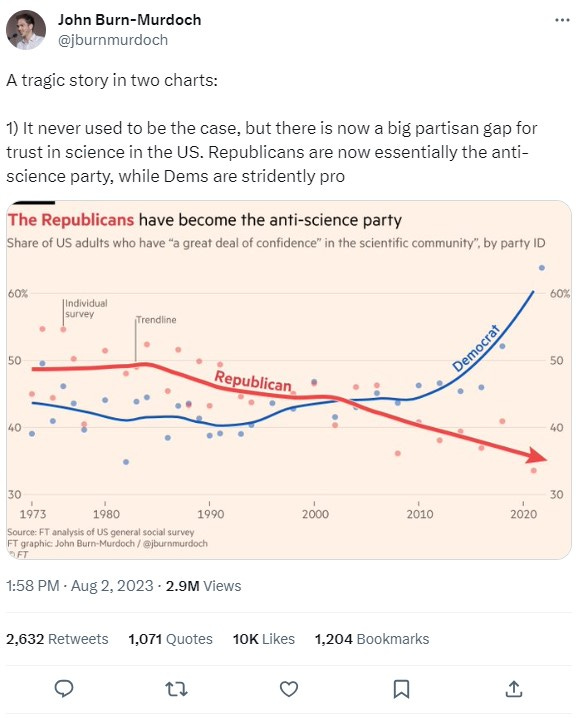Shortly before he died, the astronomer Carl Sagan (1934-1996) offered a two-part warning in an interview with Charlie Rose.
The first part of Sagan’s warning touched on humanity’s growing ignorance of science, which Sagan attributed largely to the failure of modern schools. Sagan saw this as a clear danger to humanity, especially in a society built on science and technology.
The second part of Sagan’s warning was even more profound. The University of Chicago-trained astrophysicist pointed out that science is not simply “a body of knowledge, it’s a way of thinking,” one based on skepticism and questioning. It was imperative, he said, not just that people be educated in the sciences and grounded in healthy skepticism, but that people be allowed to question and challenge those in authority.
“If we are not able to ask skeptical questions to interrogate those who tell us something is true to be skeptical of those in authority, then we’re up for grabs for the next charlatan—political or religious—who comes ambling along.
…It’s a thing that Jefferson lay great stress on. It wasn’t enough, he said, to enshrine some rights in the Constitution and the Bill or Rights, the people had to be educated and they have to practice their skepticism and their education. Otherwise, we don’t run the government, the government runs us.”
Covid and the Corruption of Science
Sagan’s warning was eerily prophetic. For the last three-plus years, we’ve witnessed a troubling rise of authoritarianism masquerading as science, which has resulted in a collapse in trust of public health.
This collapse has been part of a broader and more partisan shift in Americans who say they have “a high degree of confidence in the scientific community.” Democrats, who had long had less confidence in the scientific community, are now far less skeptical. Republicans, who historically had much higher levels of trust in the scientific community, have experienced a collapse in trust in the scientific community.
John Burn-Murdoch, a data reporter at The Financial Times who shared the data in question on Twitter, said Republicans are now “essentially the anti-science party.”

First, this is a sloppy inference from a journalist. Burn-Murdoch’s poll isn’t asking respondents if they trust science. It’s asking if they trust the scientific community. There’s an enormous difference between the two, and the fact that a journalist doesn’t understand the difference between “confidence in science” and “confidence in the scientific community” is a little frightening.
Second, as Dr. Vinay Prasad pointed out, no party has a monopoly on science; but it’s clear that many of the policies the “pro science” party were advocating the last three years were not rooted in science.
“The ‘pro science’ party was pro school closure, masking a 26 month old child with a cloth mask, and mandating an mrna booster in a healthy college man who had COVID already,” tweeted Prasad, a physician at the University of California, San Francisco.
Today we can admit such policies were flawed, non-sensical or both, as were so many of the mitigations that were taken and mandated during the Covid-19 pandemic. But many forget that during the pandemic it was verboten to even question such policies.
People were banned, suspended, and censored by social media platforms at the behest of federal agencies. “The Science” had become a set of dogmas that could not be questioned. No less an authority than Dr. Fauci said that criticizing his policies was akin to “criticizing science, because I represent science.”
This could not be more wrong. Science can help us understand the natural world, but there are no “oughts” in science, the economist Ludwig von Mises pointed out, echoing the argument of philosopher David Hume.
“Science is competent to establish what is,” Mises wrote. “[Science] can never dictate what ought to be and what ends people should aim at.”
Even more importantly, however, to shut down discussion and censor political opponents is the antithesis of the spirit of science, which has experienced major breakthroughs only by challenging and tearing down previously accepted scientific assumptions and orthodoxies.
Carl Sagan understood this, which is why he said it was so important to “ask skeptical questions” and “to be skeptical of those in authority.”
If we fail to do this, or if we are not allowed to do this, Sagan warned what will happen: we will no longer be running the government; the government will be running us.
This article originally appeared on the author’s Substack.

Jon Miltimore
Jonathan Miltimore is the Editor at Large of FEE.org at the Foundation for Economic Education.
This article was originally published on FEE.org. Read the original article.
What Would You Do If Pharmacies Couldn’t Provide You With Crucial Medications or Antibiotics?
The medication supply chain from China and India is more fragile than ever since Covid. The US is not equipped to handle our pharmaceutical needs. We’ve already seen shortages with antibiotics and other medications in recent months and pharmaceutical challenges are becoming more frequent today.
Our partners at Jase Medical offer a simple solution for Americans to be prepared in case things go south. Their “Jase Case” gives Americans emergency antibiotics they can store away while their “Jase Daily” offers a wide array of prescription drugs to treat the ailments most common to Americans.
They do this through a process that embraces medical freedom. Their secure online form allows board-certified physicians to prescribe the needed drugs. They are then delivered directly to the customer from their pharmacy network. The physicians are available to answer treatment related questions.



